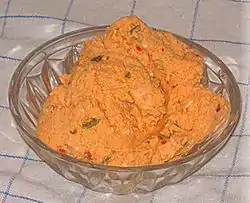Liptauer
Liptauer is a spicy cheese spread made with sheep milk cheese, goat cheese, quark, or cottage cheese.[1][2][3]
 | |
| Type | Cheese spread |
|---|---|
| Main ingredients | Cheeses such as sheep milk, goat milk, quark or cottage |
Etymology
The name is derived from the German name Liptau for the region of Liptov (Hungarian: Liptó) in northern Slovakia, a former county in the Austro-Hungarian Empire.
Overview

Similar to the Bavarian obatzda, it is a part of the regional cuisines of Slovakia (as Šmirkás, a form of the German Schmierkäse for cheese spread), Hungary (körözött),[4] Austria (Liptauer), Slovenia (liptaver), Serbia (urnebes salata, "chaos salad"), Croatia, Albania (liptao), Italy (especially in the province of Trieste), and Romania (especially in Transylvania, where it typically goes by the Hungarian name, körözött).
The three main ingredients are spreadable white cheese like quark, chives and paprika.[5] About one third of "traditional" Liptauer consists of bryndza, a sheep milk cheese. Other soft cheeses used include cottage cheese, quark and goat.[6] These are mixed with sour cream, butter or margarine and finely chopped onions; sometimes beer is added.[2] Usual spices include ground paprika, fresh parsley and whole (or ground) caraway seeds. Variants add others such as prepared mustard, Worcestershire sauce, capers and anchovy paste.
Consumption
Liptauer is traditionally eaten as an open sandwich, especially with rye bread or pumpernickel toast, or bagels, and also as an appetizer with crackers, served with beer or wine, or as a filling for cold dishes such as stuffed tomatoes, peppers, celery[2] or hard boiled eggs. Ready-made Liptauer is generally available in small tinfoil packages and has a spicy, sharp taste.[7]
In Austria, Liptauer is a typical snack served at Heurigen, Austrian wine-drinking taverns.[8] In Slovakia and Hungary many families have their own recipe for the dish. In Serbia, Liptauer is available in most restaurants that serve local cuisine. It is often made spicy with paprika, roasted red peppers and egg yolks.
Another substitutes for bryndza:
References
- Federation, International Dairy (1986). Bulletin. Bulletin. Secrétariat Général. pp. 208–209. Retrieved June 1, 2017.
- Károly Gundel (1992). Gundel's Hungarian cookbook. Budapest: Corvina. ISBN 963-13-3600-X. OCLC 32227400.
- Mendelson, A. (2013). Milk: The Surprising Story of Milk Through the Ages. Knopf Doubleday Publishing Group. pp. 303–304. ISBN 978-0-385-35121-8. Retrieved June 1, 2017.
- "Körözött, Hungarian appetizer cheese spread". Cleveland Hungarian Heritage Museum. Archived from the original on 2012-07-16. Retrieved 2012-01-08.
- Ashkenazi, Michael; Jacob, Jeanne (2006). The World Cookbook for Students. Greenwood. p. 56.
- Gundel, page 135
- Ward, Artemas (1911). "Cheese: Liptau". The Grocer's Encyclopedia. New York. p. 121. Retrieved 2008-07-09.
- Vienna Heuriger